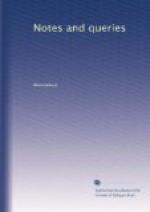P.C.S.S.
* * * * *
INSCRIPTION ON ANCIENT CHURCH PLATE.
Mr. Editor,—Herewith I have the pleasure of sending you a tracing of the legend round a representation of St. Christopher, in a latten dish belonging to a friend of mine, and apparently very similar to the alms-basins described by CLERICUS in No. 3.
The upper line—“In Frid gichwart der,” written from right to left, is no doubt to be read thus: Derin Frid gichwart. The lower line contains the same words transposed, with the variation of “gehwart” for “gichwart.” The words “gehwart” and “gichwart” being no doubt blunders of an illiterate artist.
In Modern German the lines would be:—
Darin Frieden gewarte—Therein
peace await, or look for. Gewarte
darin Frieden—Await,
or look for, therein peace.
In allusion, perhaps, to the eucharist of alms, to hold one or the other of which the dish seems to have been intended.
.
* * * * *
ANECDOTES OF BOOKS.
MS. of English Gesta Romanorum.
Your work, which has so promising a commencement, may be regarded as, in one department, a depository of anecdotes of books. Under this head I should be disposed to place Notes of former possessors of curious or important volumes: and, as a contribution of this kind, I transmit a Note on the former possessors of the MS. of the Gesta Romanorum in English, which was presented to the British Museum in 1832, by the Rev. W.D. Conybeare, now Dean of Llandaff, and has been printed at the expense of a member of Roxburgh Club. It is No. 9066 of the MSS. call Additional.
Looking at it some years ago, when I had some slight intention of attacking the various MSS. of the Gesta in the Museum, I observed the names of Gervase Lee and Edward Lee, written on a fly-leaf, in the way in which persons usually inscribe their names in books belonging to them; and it immediately occurred to me that these could be no other Lees than members of the family of Lee of Southwell, in Nottinghamshire, who claimed to descent from a kinsman of Edward Lee, who was Archbishop of York in the reign of Henry VIII, and who is so unmercifully handled by Erasmus. The name of Gervase was much used by this family of Lee, and as there was in it an Edward Lee who had curious books in the time of Charles II, about whose reign the names appears to have been written, there can, I think, be little reasonable doubt that this most curious MS. formed a part of his library, and of his grandfather or father, Gervase Lee, before him.
Edward Lee, who seems to have been the last of the name who lived in the neighbourhood of Southwell, died on the 23rd of April, 1712, aged 76.
That he possessed rare books I collect from this: that the author of Grammatica Reformata, 12mo. 1683, namely John Twells, Master of the Free School at Newark, says, in his preface, that he owed the opportunity of perusing Matthew of Westminster “to the kindness of that learned patron of learning, Edward Lee, of Norwell, Esquire.”




